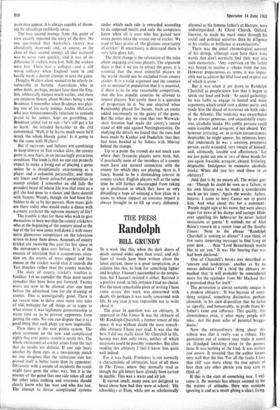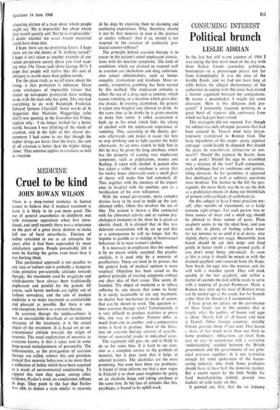Randolph
THE PRESS BILL GRUNDY
In a week like this, when the dark doors of death seemed wider open than usual. and mil- lions of words have been written about the latest entrant, there is a great temptation, in a column like this, to look for something lighter and brighter. I haven't succumbed to the tempta- tion, but I haven't resisted it either. Resisted is a positive word; in this instance I had no choice. For the most remarkable piece of writing I have come across this week was concerned with death. Or perhaps it was really concerned with life. In any case it was impossible not to write about it: The piece in question was an obituary. It appeared in The Times. It was the obituary of Mr Randolph Churchill, a former tenant of this space. It was without doubt the most remark- able obituary I have ever read. It was also the best. I did not really know Mr Churchill in life, having met him only twice, neither of which occasions could he possibly remember. But after reading this obituary I feel I know him quite well indeed.
For it was frank. Frankness is not normally a characteristic of obituaries, least of all those in The Times, where they normally read as though the gilt letters have already been carved in marble. This was a warts and all job.
It started small; many men are delighted to boast about how bad they Were at school: 'His schooldays at Eton, while not as scholastically abysmal as his famous father's at Harrow, were undistinguished. At Christ Church, Oxford, likewise, he made his mark more through his social and political activities than by diligence at his studies or brilliance at examinations.'
There was the usual chronological account of his doings, although even here there were words that don't normally find their way into such memorials: 'Any aspersion on the father was bound to receive a rebuke from the son. However preposterous its terms, it was impos- sible not to admire the filial love and respect out of which it arose.'
But it was when it got down to Randolph Churchill as people knew him that it began to speak out loud and bold : 'At social gatherings he was liable to engage in heated and noisy arguments which could ruin a dinner party, and made him the dread of hostesses on both sides of the Atlantic. The tendency was exacerbated by an always generous, and occasionally exces- sive, alcoholic intake. His public persona could seem irascible and arrogant, if not absurd. Yet, however irritating, or, in certain circumstances, despicable, he might appear, his intimates knew that underneath he was a sensitive, perceptive person, easily wounded, very unsure of himself, and, ultimately, lovable and affectionate.' Let me just point out one or two of those words for you again. Irascible, arrogant, absurd. Irritating, despicable. Indulgence in excessive alcoholic intake. When did you last read those in an obituary?
And that is by no means all. The writer goes on : 'Though he could be seen as a failure, in his own bizarre way he made a considerable mark on his times.' Again the words: failure, bizarre. I come to bury Caesar not to praise him. And what about this for a comment: 'People might sigh at his name, but were always eager for news of his doings and sayings. How- ever appalling his behaviour he never lacked invitations or guests.' It reminds me of Alan Brien's remark in a recent issue of the Sunday Times: 'Next to the phrase -"Randolph Churchill is coming to dinner" I can think of few more unnerving messages to find lying on your desk . . . than "Lord Beaverbrook would like to tee you." It was like hearing that mar had been declared.'
One of Churchill's books was described a, 'uneven and tendentious,' another as 'by no means definitive.' Of a third the obituary re- marked that 'it will probably be remembered more for the rejoinder from Mr Macleod that it provoked than for itself.'
The peroration is almost certainly unique in a modern obituary: 'It was because of some- thing original, something distinctive, perhaps clownish, in his own disposition that he failed so signally, and honourably, to profit from his father's fame and influence. This quality, this clownishness even, is what many people will miss: not the poor echo of parental bragga- docio.'
Now the extraordinary thing about this tribute was that it really was a tribute. The quotations out of context may make it sound an ill-judged knocking piece in the poorest taste. It was nothing of the kind. It was written con amore. It revealed that the author knows very well that the line 'For all thy faults I lOve thee still' says more about the true nature of love than any other phrase you may care to think of.
If this is the start of something new, I wel- come it. De mortuis has always seemed to me the wettest of attitudes. Here was someone ignoring it and is'a result giving a clear, living.
wheezing picture of a man about whom people might say 'He is impossible' but about whom they would quickly add 'But he is irreplaceable.' I doubt whether the usual frozen memorial could have done that.
I hope there are no protesting letters. I hope there are no old shouts of 'Is nothing sacred?' I hope it isn't taken as another example of our rotten permissive society (have you tried read- ing what The Times said about George IV?). I hope that people will realise that this sort of obituary is worth more than golden words.
For the plain truth, as we all know about the living, is that perfection is inhuman. Those stony catalogues of impossible virtues that clutter up newspaper graveyards have nothing to do with the man who has gone. This one had everything to do with Randolph Frederick Edward Spencer Churchill. Some words of St Augustine that Malcolm Muggeridge (who else?) was quoting in the Guardian last Friday explain why: 'I no longer wished for a better world, because I was thinking of the whole of creation, and in the light of this clearer dis- cernment I had come to see that though the higher things are better than the lower, the sum of all creation is better than the higher things alone.' That sentence applies to creatures as well as creation.











































 Previous page
Previous page